Properly winterizing your pool is important for its lifespan. However, does that mean you need to cover the pool heater during the cold months? We have taken the time to research this question to help you prepare for the cold weather.
If a pool heater is winterized correctly, you don't have to cover it. However, some experts say you can cover the heating element with a towel or heat cover for extra insulation (optional). If you choose to cover the pool heater, it will give it extra insulation and protection from debris and snow.
Pools are an expensive investment, so it is critical to take the proper steps during the winter. In this article, we'll take a look at why you don't necessarily need to cover your pool heater. In addition, we will answer other frequently asked questions about pools, so keep reading!
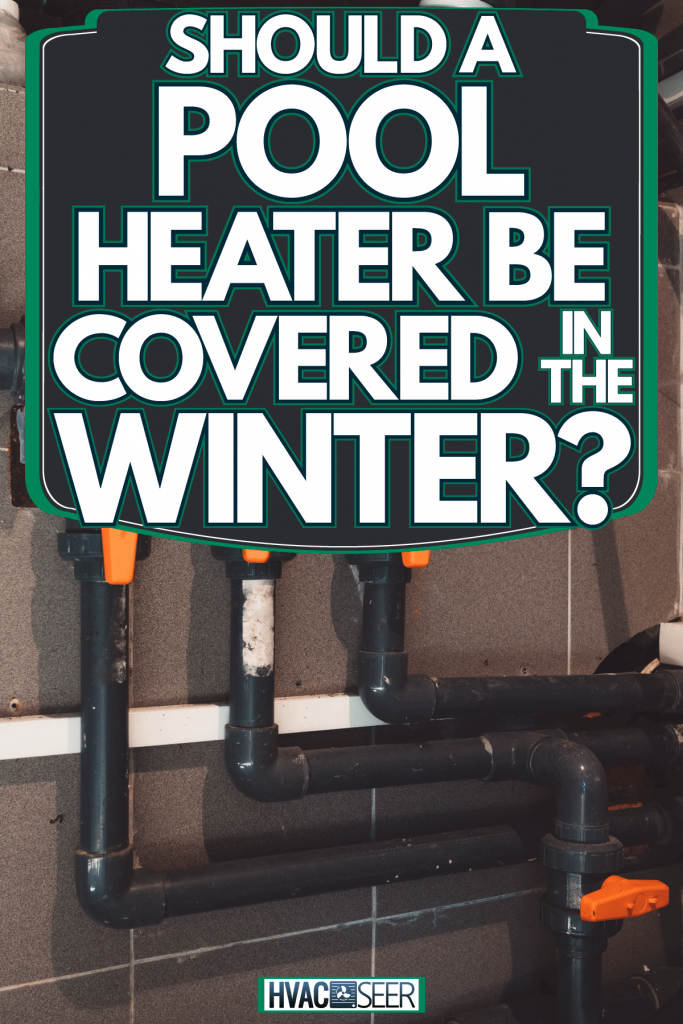
Should A Pool Heater Be Covered In The Winter?
Most pool heaters include a thermostat to automatically regulate the temperature. This means that you can turn it off and restart it as necessary. If your pool heater does feature a thermostat, then no, you won't need to cover the entire heating mechanism.
Covering the entire heater can cause corrosion and rust issues over time. In addition, if you cover the pool heater in the winter while the pool is in use then the heater won't get the proper ventilation it needs to work properly.
While you don't need to cover the entire heating mechanism, some experts say covering the heat pump with a cover can help protect it from snow and debris during the winter. Even though this is optional, it is a good idea to do so.
Instead of worrying about covering the pool heater, it is more important to cover the pool itself with a tarp, solar cover, or pool cover. This helps insulate the pool and protect it from any damage from debris. In most areas, this is a requirement for winterizing your pool.
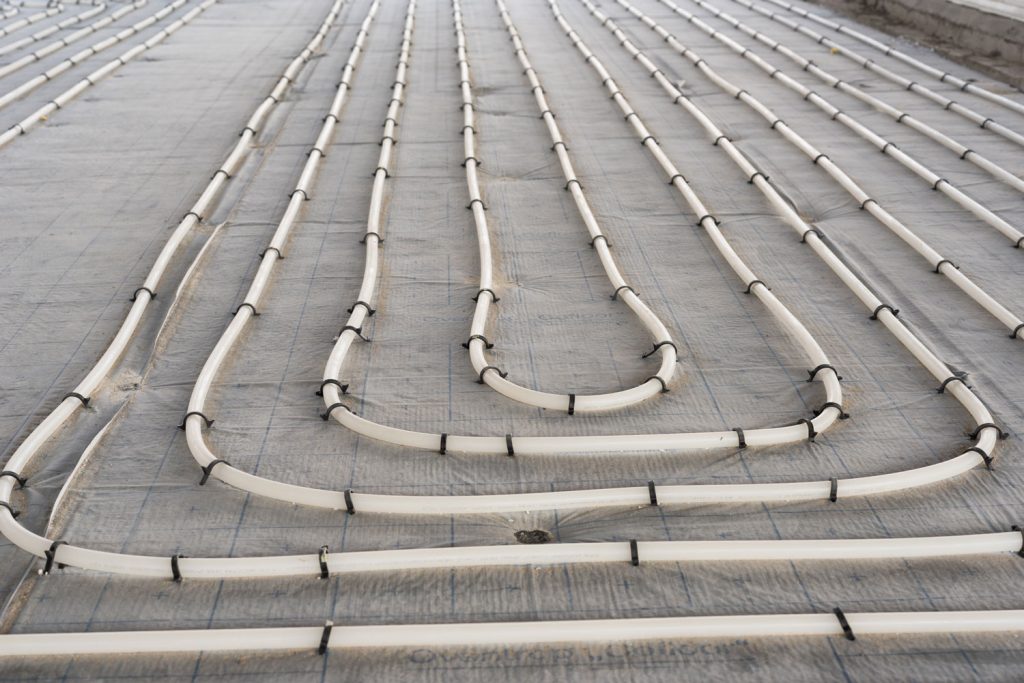
How do you winterize a pool heater?
Pool heaters are typically at the top of the list for your pool equipment. The last thing you want this winter is for your heater to break down when you need it most.
Replacing a heating element can be expensive, and proper care during the colder months helps prevent expensive repairs later. Let's take a look at how to properly winterize your pool:
- First, check your pool heater to ensure that it's in good working order. Then, if the unit has a digital display, you should check the readings for irregularities.
- In addition, look at all of your connections and seals for cracks or leaks. Finally, don't forget to change the filter if necessary before you begin to winterize your pool heater.
- For gas or propane heaters, you should turn off the flow of fuel at the tank or service cylinder. For electric heaters, simply turn off the power.
- Then drain your unit by opening up all your drains and allowing water to pass through until it is no longer warm to the touch. You can also run a garden hose into your unit for several minutes to help drain it quickly.
- Next, you will need to open all winterization ports on the pool. These openings are usually located on the bottom of your heater and should be visible after you remove any bolts.
- Once these ports are exposed, remove any drain plugs that you find. Any leftover water could freeze.
- Next, you will need to blow through the lines with a blower meant for pool winterizing. A leaf blower will also work. The idea is to blow into your lines to push out any water or debris. Start by blowing through the intake line, moving on to the heat exchanger, supply lines, and finally, the return line.
- After finishing this process, replace all of your plugs, seal off all winterization ports, and reattach your drain plugs.
- After doing this, you can move on to draining your pool.
When completely done with the process, you will want to replace any insulation around your heater (optional) and cover it with a tarp, solar cover, or pool cover.
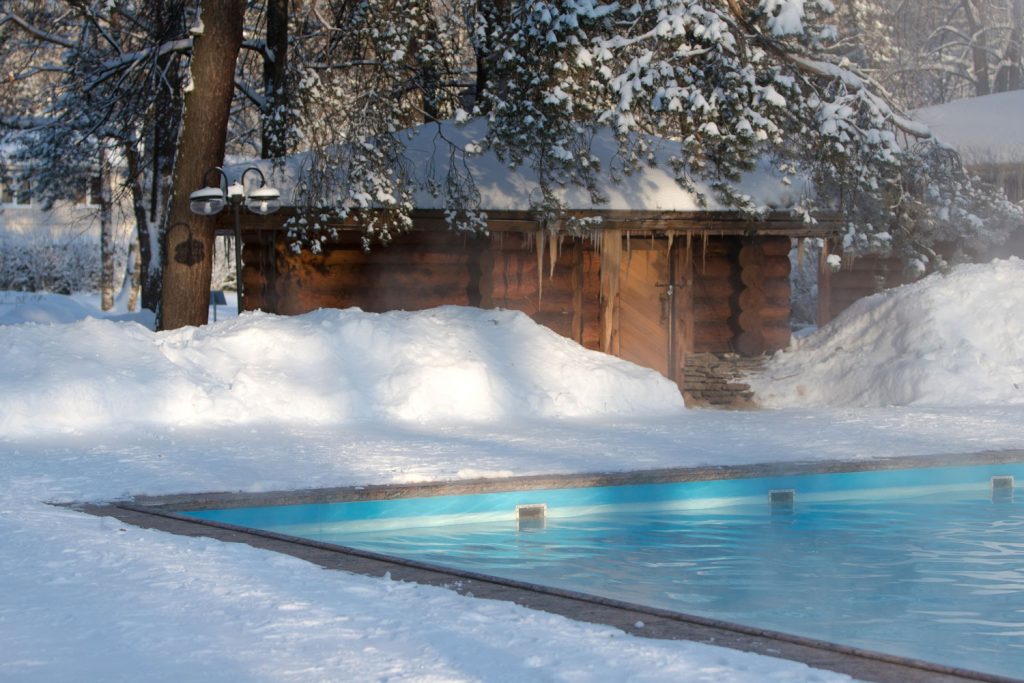
Can a pool heater be enclosed?
Pool heaters should never be enclosed, as they need outside air to heat the pool. If enclosed, it won't get the proper ventilation to work correctly.
Suppose you need to cover the pool heater due to animals or children. Then you can fence off the pool heater, but make sure you do not cover the top to ensure that it has access to air.
How much ventilation does a pool heater need?
The amount of ventilation for a pool heater varies depending on the unit and manufacturer. It is important to consulter the manufacturer manual for proper ventilation for your pool heater to ensure required venting.
If you don't, then you run the risk of improper combustion and sooting. Typically, heaters require an input of 1,000 BTUs per square inch to work correctly in an unobstructed opening.
Should I turn on the pool heater in the winter?
If you live in a region with colder winters but want to continue using your pool, then using the pool heater is a must.
In this case, it is vital to have your heater on a timer to ensure the pool will stay at proper temperatures. This is important especially if you plan on using your pool during the winter to avoid freezing.
In addition, it is better to have your pool heater on a timer to maintain the temperature instead of only turning it on when you want to use it. If you do, then you will cause more stress on the heater and use more energy, thus raising your energy bills.
Running a pool heater in the winter will raise your energy bills. The reason is due to the low outside temperatures. Since the temperatures are colder than normal, the heater will have to work overtime to keep the pool at the desired temperature.
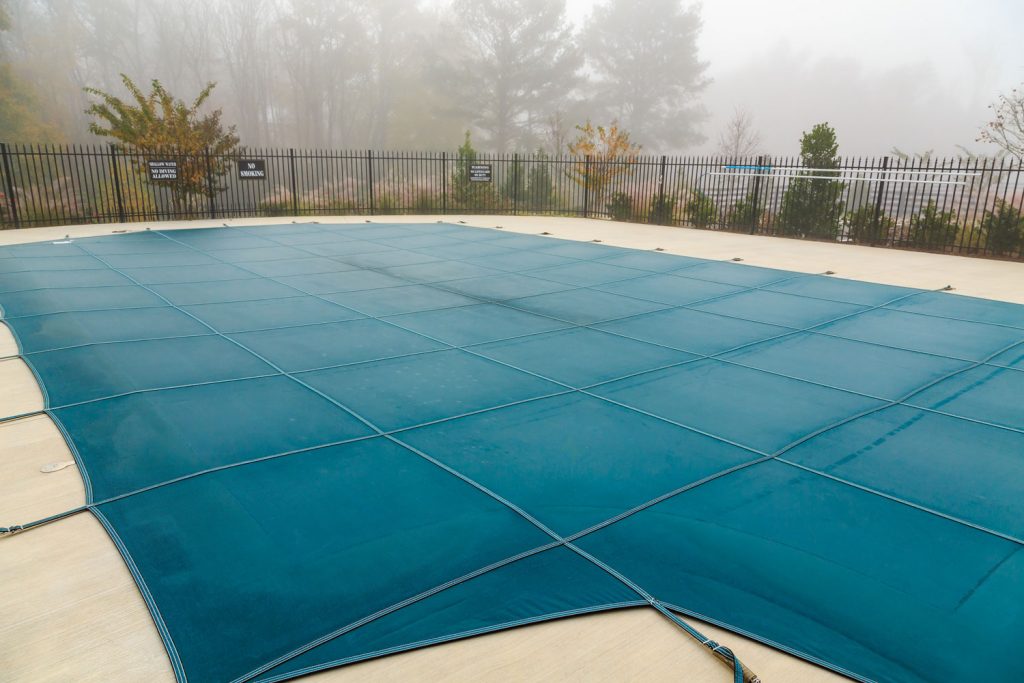
Pool heater won't turn on—what could be wrong?
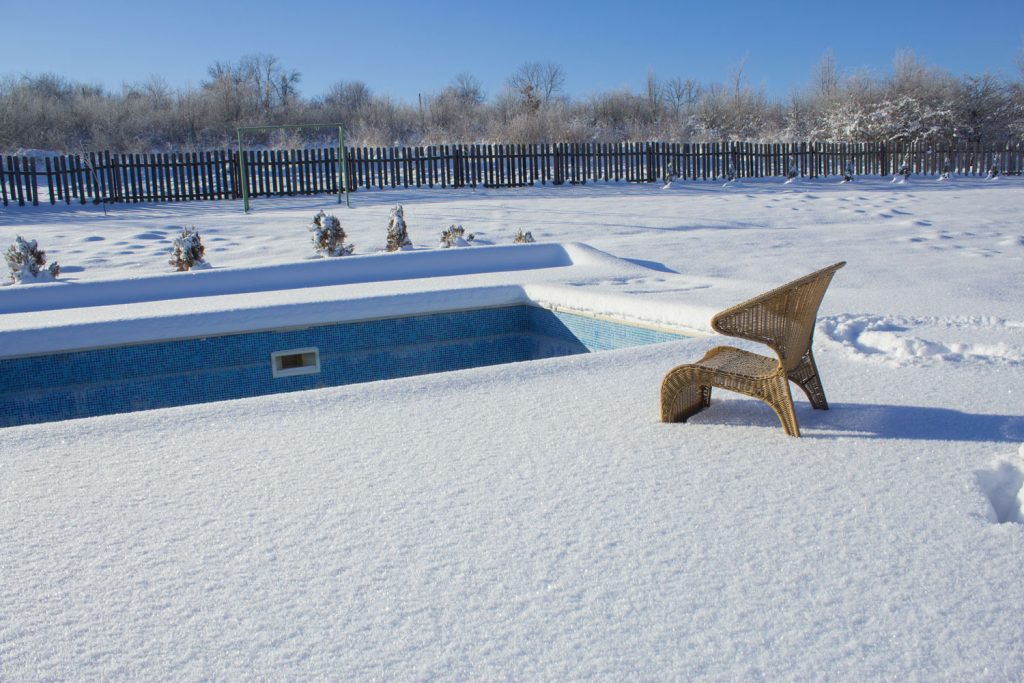
If your pool heater doesn't turn on, then your pool will drop to a much lower temperature. The reason your pool heater isn't turning on could be due to the following:
Bad pilot light
This is a common problem with gas pool heaters. If you turn on the heater and nothing happens, then your pilot light could have gone out due to several reasons such as a bad thermocouple, dirty combustion chamber, no propane, or a lack of power going to the unit.
Please note that usually, when the pilot light goes out, the main burner will not follow.
Startup problems
If there are any issues, your heater's motherboard likely needs to be replaced. This part is vital to the operation of your unit by controlling everything from heating, airflow, and safety.
Bypassed winterization system
Your bypass line might have been removed during the fall, or it might have fallen off. This is an essential step in the winterization process where you shut down your heater so there are no issues with corrosion or leaks.
Loss of power
If, after checking the pilot light and doing the full diagnostic test on your heater, you still can't get it to turn on, then it could be a loss of power. This can happen if you have a faulty circuit board or starter switch.
If everything is fine, the heater will need to be replaced by a professional specializing in pool heaters.
Low gas supply
Your pilot light might have gone out due to low gas if you have a gas pool heater. To solve this problem, simply turn off the power to your heater and turn it on again to relight the pilot light once you have adequate gas levels.
Clogged filter
The pool filter might be clogged with debris. As a result, this will lower the pressure in your heater, which means it won't turn on.
Clogged pump basket
The pump basket is located in your pump, and it might be clogged with debris. Check the pump basket and remove any debris, and try restarting the heater.
Faulty upper limit switch
This switch prevents the heater from overheating. If it has gone bad, your heater will shut off too early, which means it won't heat the pool to its desired temperature.
Bad thermostat
If everything else is fine, you might need to replace your thermostat. This part is vital to the operation of your heater since it keeps track of the temperature.
Bad gas valve
If you have a gas pool heater, your gas valve might need to be replaced. You can check this by removing the wiring to the gas valve and the thermostat. If the heater doesn't shut off, then your gas valve is faulty.
Blown fuse
Your power fuse might have blown. This is a crucial part that will not allow your heater to turn on if blown. In this case, you will need to replace the fuse for your pool heater to function correctly again.
Faulty pool heater
Your pool heater might need to be replaced if everything else is fine and you still can't get your heater to work correctly. There are warning signs to watch for that you have a bad pool heater.
For instance, if your pool isn't maintaining proper temperatures and is fluctuating even if you don't change the thermostat, this is a tell-tale sign. In addition, strange noises coming from the heater, smoke smells, or have a sudden shutdown are all signs that your pool heater is faulty.
In the end, if you are having any issues with your pool heater not turning on when it should be, then you might need to check all of the above to fix the problem.
If you are still having issues getting your pool heater to turn on after trying all of these things, please call a professional specializing in repairing pool heaters.
Final Thoughts
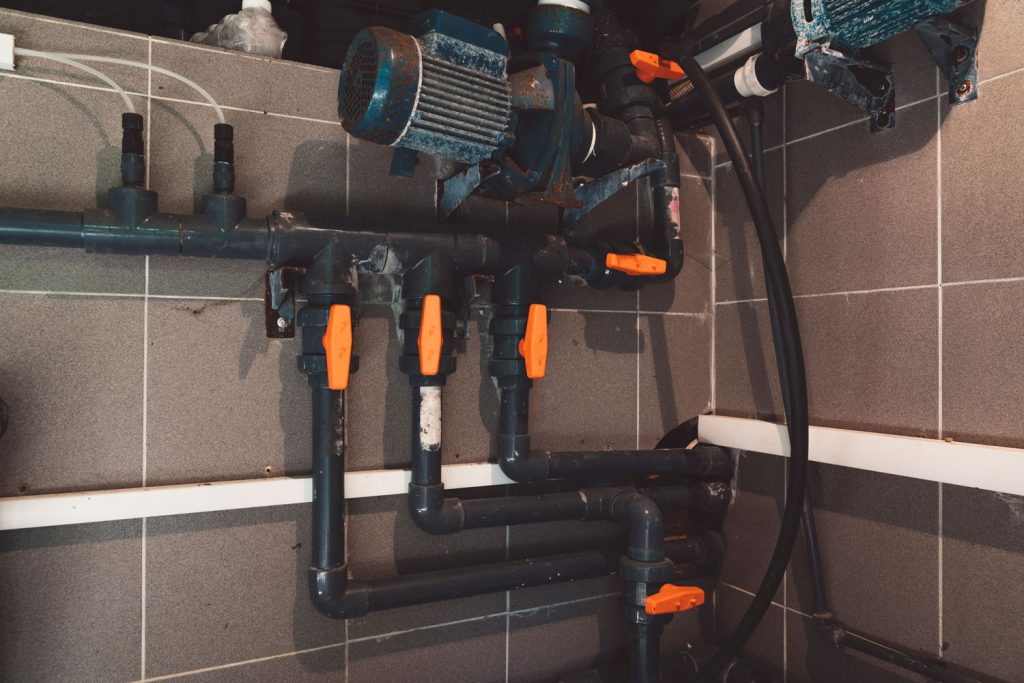
A pool heater is an essential part of your swimming pool since it will keep the water at a consistent temperature for swimmers. If you find yourself with startup problems or other issues, contact a specialist in your area.
For more articles like this one, check out these posts:
How Long Do Pool Heaters Last?
